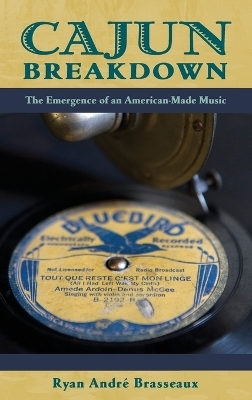
Cajun Breakdown
The Emergence of an American Made Music
Seiten
2009
Oxford University Press Inc (Verlag)
978-0-19-534306-9 (ISBN)
Oxford University Press Inc (Verlag)
978-0-19-534306-9 (ISBN)
Cajun Breakdown examines the social and cultural roots of Cajun music's development through 1950. The idiom's synthetic nature suggests an extensive and intensive dialogue with popular culture that extinguishes the myth that Cajuns were an insular folk group astray in the American South
In 1946, Harry Choates, a Cajun fiddle virtuoso, changed the course of American musical history when his recording of the so-called Cajun national anthem "Jole Blon" reached number four on the national Billboard charts. Cajun music became part of the American consciousness for the first time thanks to the unprecedented success of this issue, as the French tune crossed cultural, ethnic, racial, and socio-economic boundaries. Country music stars Moon Mullican, Roy Acuff, Bob Wills, and Hank Snow rushed into the studio to record their own interpretations of the waltz-followed years later by Waylon Jennings and Bruce Springsteen. The cross-cultural musical legacy of this plaintive waltz also paved the way for Hank Williams Sr.'s Cajun-influenced hit "Jamabalaya."
Choates' "Jole Blon" represents the culmination of a centuries-old dialogue between the Cajun community and the rest of America. Joining into this dialogue is the most thoroughly researched and broadly conceived history of Cajun music yet published, Cajun Breakdown. Furthermore, the book examines the social and cultural roots of Cajun music's development through 1950 by raising broad questions about the ethnic experience in America and nature of indigenous American music. Since its inception, the Cajun community constantly refashioned influences from the American musical landscape despite the pressures of marginalization, denigration, and poverty. European and North American French songs, minstrel tunes, blues, jazz, hillbilly, Tin Pan Alley melodies, and western swing all became part of the Cajun musical equation. The idiom's synthetic nature suggests an extensive and intensive dialogue with popular culture, extinguishing the myth that Cajuns were an isolated folk group astray in the American South. Ryan André Brasseaux's work constitutes a bold and innovative exploration of a forgotten chapter in America's musical odyssey.
In 1946, Harry Choates, a Cajun fiddle virtuoso, changed the course of American musical history when his recording of the so-called Cajun national anthem "Jole Blon" reached number four on the national Billboard charts. Cajun music became part of the American consciousness for the first time thanks to the unprecedented success of this issue, as the French tune crossed cultural, ethnic, racial, and socio-economic boundaries. Country music stars Moon Mullican, Roy Acuff, Bob Wills, and Hank Snow rushed into the studio to record their own interpretations of the waltz-followed years later by Waylon Jennings and Bruce Springsteen. The cross-cultural musical legacy of this plaintive waltz also paved the way for Hank Williams Sr.'s Cajun-influenced hit "Jamabalaya."
Choates' "Jole Blon" represents the culmination of a centuries-old dialogue between the Cajun community and the rest of America. Joining into this dialogue is the most thoroughly researched and broadly conceived history of Cajun music yet published, Cajun Breakdown. Furthermore, the book examines the social and cultural roots of Cajun music's development through 1950 by raising broad questions about the ethnic experience in America and nature of indigenous American music. Since its inception, the Cajun community constantly refashioned influences from the American musical landscape despite the pressures of marginalization, denigration, and poverty. European and North American French songs, minstrel tunes, blues, jazz, hillbilly, Tin Pan Alley melodies, and western swing all became part of the Cajun musical equation. The idiom's synthetic nature suggests an extensive and intensive dialogue with popular culture, extinguishing the myth that Cajuns were an isolated folk group astray in the American South. Ryan André Brasseaux's work constitutes a bold and innovative exploration of a forgotten chapter in America's musical odyssey.
Louisiana native Ryan André Brasseaux is a doctoral student at Yale University. A former Research Associate for public radio's American Routes hosted by Nick Spitzer, Brasseaux has served as a Cajun cultural expert for the National Council for the Traditional Arts, Associated Press, National Public Radio, Public Radio International, Canadian Broadcast Corporation, National Film Board of Canada, and the Food Network. He has lectured across the country, including the keynote address at Nashville's International Country Music Conference and invited lectures at Yale University, Tulane University, the Brooklyn Botanic Gardens, and to gatherings of Fullbright scholars.
1. SOCIAL MUSIC
| Erscheint lt. Verlag | 27.8.2009 |
|---|---|
| Reihe/Serie | American Musicspheres |
| Zusatzinfo | 43 black and white half tone illustrations |
| Verlagsort | New York |
| Sprache | englisch |
| Maße | 236 x 157 mm |
| Gewicht | 610 g |
| Themenwelt | Kunst / Musik / Theater ► Musik ► Musiktheorie / Musiklehre |
| ISBN-10 | 0-19-534306-9 / 0195343069 |
| ISBN-13 | 978-0-19-534306-9 / 9780195343069 |
| Zustand | Neuware |
| Informationen gemäß Produktsicherheitsverordnung (GPSR) | |
| Haben Sie eine Frage zum Produkt? |
Mehr entdecken
aus dem Bereich
aus dem Bereich
Grundbegriffe, Harmonik, Formen, Instrumente
Buch | Softcover (2021)
Philipp Reclam (Verlag)
7,80 €
globalisiertes Komponieren
Buch | Softcover (2023)
edition text + kritik (Verlag)
49,00 €


